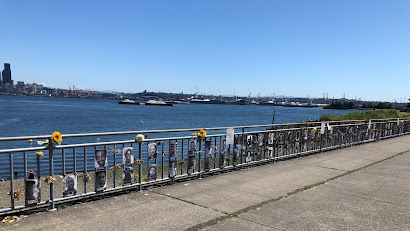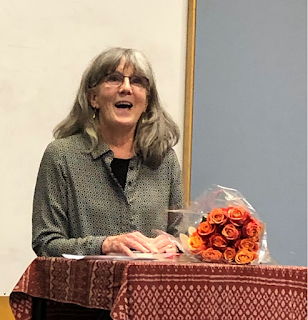Two blond pre-teens cycle up the long incline of my West
Seattle street. Doors and windows open to the late spring sun, I hear their
laughter and chatter from the dining table where I work. I see them through my
large front window.
“I can’t breathe” one hollers to the other. Laughter
cascades down the street.
Does she know what she is saying? Do they understand the
agony of those words, the pain they cause others as they waft through open
windows?
I want to scream at them. I want to race after them, stop
them, sit them down for a 400-year history lesson on systematic racism. But they are gone before I wipe my
tears.
I have not been writing. The past four months have been a
time of stress and struggle and surreal joy. I am a grandmother; my baby is a
mother.
My daughter and her husband adhere to strict COVID-19
protocols and remain closed into their hospital room on Capitol Hill for the
two-night hospital stay. They watch as protesters march to the East Precinct and
chants of “Black Lives Matter” float from the street five floors below.
During the worst world-wide pandemic since the Spanish Flu
and the most significant social upheaval in our nation since the Civil War, my
grandson is born. This tiny innocent enters the world as a privileged white boy
by no choice of his own.
I begin adding antiracist children’s books to my summer reading
list. The list grows as I collect titles to educate myself in a struggle to convert
a lifetime of white guilt and empathy into antiracist understanding and action.
Perhaps I could find antiracist books for pre-teens, books
to put in the Free Neighborhood Libraries that seem to dot every other block of
my middle-class neighborhood. Would the girls on the bicycles read them? Would
their parents?
As the academic year closes, as my first quarter of online
teaching comes to an end, I embrace the freedom to read and think. I look
forward to long walks, long bike rides, and long hours watching my grandson grow.
And yes, maybe I’ll squeeze in some writing, too.
This is a long summer reading list, and it's likely I won't get through all of it, but I intend to do my best. In no particular order, here goes:
So You Want to Talk About Race – Ijeoma Oluo
The New Jim Crow: Mass Incarceration in the Age of
Colorblindness – Michelle Alexander
Heavy – Kiese Laymon
Stamped from the Beginning: The Definitive History of Racist Ideas in America
- Ibram X. Kendi
How to be an Anti-Racist – Ibram X. Kendi
They Can’t Kill Us All – Wesley Lowery
The Fire Next Time – James Baldwin
My Grandmother’s Hands: Racialized Trauma and the
Pathway to Mending Our Hearts and Bodies – Resimaa Menakem
Between the World and Me – Ta-Nehisi Coates
We Live for the We: The Political Power of Black Motherhood
– Dani McClain
White Fragility: Why It’s So Hard for White People
to Talk about Racism – Robin Deangelo
Raising White Kids: Bringing Up Children in a
Racially Unjust America – Jennifer Harvey
The Warmth of Other Suns: The Epic Story of
America’s Great Migration – Isabel Wilkerson
Me & White Supremacy: Combat Racism, Change the World, and Become a Good Ancestor - Layla F. Saad
The Truth About White People - Lola E. Peters
Just Mercy: A True Story of the Fight for Justice
(adapted for young adults) - Bryan Stevenson
Not My Idea: A Book about Whiteness – Anastasia Higginbotham
Let’s Talk About Race – Julius Lester
A is for Activist – Innosanto Nagara
For help compiling this list, my thanks to
PegasusBook Exchange,
“13 Books You Should Read About Black Lives” as well
as the recommendations of colleagues and friends.
If you have other titles to suggest, please share either in
the comment box or email me at
aw@arleenwilliams.com. Thank you!




























